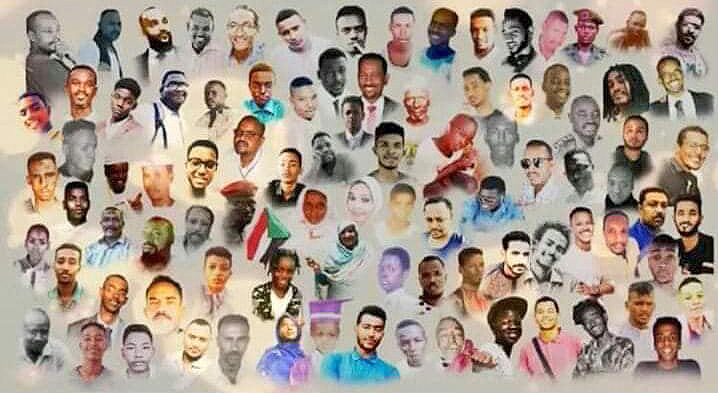Sudan marks 6th anniversary of Khartoum sit-in massacre: Open wounds and demands do not die

Martyrs of the June 3 2019 Khartoum Sit-in Massacre (Image Supplied)
On the sixth anniversary of the massacre of the dispersal of the sit-in of the General Command in Khartoum, which took place on June 3, 2019, calls for accountability and justice are renewed, amid assurances from the forces of the revolution and civil society that this crime does not fall under the statute of limitations, and will not be forgotten no matter how long it takes.
On that fateful day, a peaceful sit-in was dispersed by excessive force by the military council and its militias, and pure blood was shed for young men and women who carried nothing but their dreams of a free and democratic homeland. This crime still represents a deep wound in the memory of the Sudanese, and a pivotal event in the course of the glorious December revolution.
The Sit-In Republic: The Dream State that frightened the Deep State
Observers believe that the sit-in in front of the General Command was not just a demonstration but formed the nucleus of a miniature “humanitarian republic”, in which the Sudanese people from different regions and backgrounds converged, in a microcosm of the civil state sought by the revolution. Some analysts, including leader Yasser Arman, liken it to the Paris Commune in terms of its symbolic depth and ability to create a new reality that transcends the old regime.
Renewed data: No compromise on the blood of martyrs
On this anniversary, several revolutionary and civil forces issued statements affirming the firm position on the massacre of the General Command:
“Angry without Borders”: We continue to resist
The movement stressed that the massacre of the leadership did not bring down the revolution, but rather exposed its enemies, and stressed that the blood of the martyrs is not sold or compromised, renewing its commitment to resist what it described as the “Janjaweed militia” until the liberation of the homeland from domination and destruction.
Sudan Constituent Alliance: Killers are known
The coalition blamed the old regime, led by the Islamists, stressing that the massacre of the leadership was the same one who ignited the dawn of the current war in April 2023. The coalition criticized the failure of military leaders to appear before the investigation committee, at a time when leaders from the Rapid Support had previously appeared.
Bahri Neighbourhood Committees: Don’t forget. We don’t forgive
The resistance committees described the massacre as a full-fledged crime committed in cold blood, stressing that the option of retreat is out of the question, that the revolution is still ongoing, and that justice is inevitably coming.
Sudan Doctors Syndicate: The army is for the barracks, not for the authority
In its statement, the preliminary committee of the Sudan Medical Syndicate said that the massacre of the leadership represents a black point in the history of the country, calling for the establishment of a national army with a national doctrine that does not interfere in politics, protects the people and does not turn against them, and puts the interest of the homeland above any loyalties.
Civil Democratic Alliance (Samoud): It will not fall under the statute of limitations
The coalition condemned the cancellation of the inquiry committee clause on the recent constitutional amendments, and considered the ongoing war an extension of attempts to eliminate the December revolution, renewing the pledge to adhere to civilian rule and restore the democratic path.
The perpetrators are known by name
Political activist Jaafar Khader from Gedaref confirmed that military leaders, including Abdel Fattah al-Burhan, Mohamed Hamdan Daglo (Hemedti), Yasser al-Atta, Shams al-Din Kabashi, and Abderrahim Dagalo, were involved in the crime of dispersing the sit-in, according to testimonies and video documents circulating. Khader rejected attempts to justify the presence of unknown elements wearing the RSF, praising the role of honorable members of the armed forces, led by the martyr Mohammed Siddiq.
Khader stressed that the involvement of certain leaders does not mean hostility to the military institution, especially in its current battle against what he described as the “Emirati Janjaweed aggression” on Sudan.
Deferred justice: a demand that does not fall
Sudanese and international human rights organizations renewed their demand for a transparent and independent investigation into the crime, and denounced what they described as official evasion of the realization of the right, noting that transitional justice cannot be built on oblivion or obliteration of facts.
No peace without justice
In light of the raging war in Sudan, restoring the path of justice and retribution for the martyrs is becoming increasingly important as an essential entry point for any lasting peace. The sixth anniversary of the massacre of the General Command remains an occasion to renew the covenant with the blood of the martyrs, and to confirm that the revolution continues, and that the truth, no matter how long it takes, must triumph.











 and then
and then